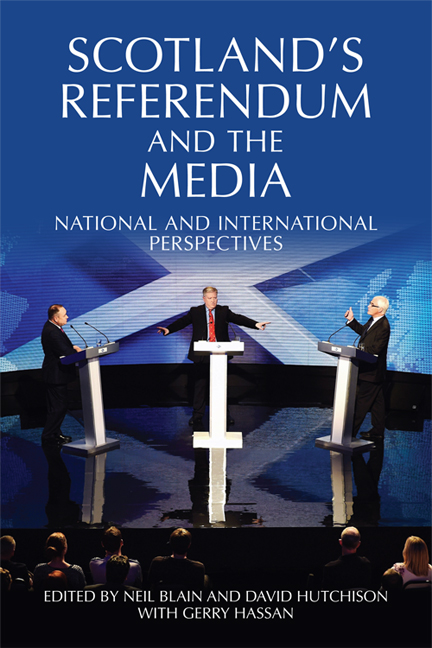Book contents
- Frontmatter
- Contents
- Preface
- Part One The Referendum in Scotland
- Part Two Views from the UK
- Part Three International Perspectives
- 13 ‘Knock-on Consequences’: Irish Media Coverage of the Scottish Referendum
- 14 Spain, Catalonia and the Scottish Referendum: A Study in Multiple Realities
- 15 The French View
- 16 The Scottish Referendum in Austrian, German and Swiss Media
- 17 The Scottish Referendum: The View from Quebec
- 18 The Scotland Referendum in the English-language Canadian Media
- 19 Australia and the Scottish Independence Referendum
- 20 Afterword: Reimagining Scotland in a New Political Landscape
- Notes on the Contributors
- Index
18 - The Scotland Referendum in the English-language Canadian Media
from Part Three - International Perspectives
Published online by Cambridge University Press: 05 August 2016
- Frontmatter
- Contents
- Preface
- Part One The Referendum in Scotland
- Part Two Views from the UK
- Part Three International Perspectives
- 13 ‘Knock-on Consequences’: Irish Media Coverage of the Scottish Referendum
- 14 Spain, Catalonia and the Scottish Referendum: A Study in Multiple Realities
- 15 The French View
- 16 The Scottish Referendum in Austrian, German and Swiss Media
- 17 The Scottish Referendum: The View from Quebec
- 18 The Scotland Referendum in the English-language Canadian Media
- 19 Australia and the Scottish Independence Referendum
- 20 Afterword: Reimagining Scotland in a New Political Landscape
- Notes on the Contributors
- Index
Summary
Coverage of Scotland's referendum in Canada's English-language media highlights all the shortcomings that have come to dominate the performance of the Canadian media in the last decade as a result of the online revolution, the dramatic decline in advertising revenue and massive layoffs and cost-cutting across reporting and editing ranks in all the country's mainstream print, broadcast and online media.
Canadian news organisations reported on the referendum campaign in a largely episodic fashion that reflected the cutbacks in foreign correspondents employed by the Canadian media. Much of the time the story was simply ignored. When it appeared possible that Scots would vote for independence, there was a rush of last-minute coverage with all the contextual shortcomings that are integral parts of parachute journalism by foreign correspondents.
At least, however, in the last days before the vote, major Canadian news organisations sent their own reporters to Scotland from Canada so Canadian audiences would get the story through Canadian eyes. For almost all the preceding year that simply did not happen, largely due to the decline in the number of foreign correspondents. Even the remaining few Canadian correspondents based in London rarely ventured north during the year before the vote, as they were often preoccupied by whatever major international stories were underway in Europe or the Middle East at the time. That meant for much of the year before the referendum, any knowledge of the campaign Canadians received from their media came from reporters working for international news wire services such as Bloomberg and Associated Press or the syndicated service of Britain's Daily Telegraph or the Washington Post in the United States. Canadians were not told most of the story through Canadian eyes.
There were two other common features of coverage during the year before 18 September 2014. Much of the material published and broadcast did not emanate from Scotland but instead came from Toronto, London, Montreal and Ottawa. There is rarely, if ever, a situation where either reporting or commenting is better done from a distance than from on the ground where events are taking place. But in an era of squeezed financial resources and cutbacks, that long-distance reporting is now commonplace, frequently to the detriment of audiences’ understanding of the stories presented to them.
- Type
- Chapter
- Information
- Scotland's Referendum and the MediaNational and International Perspectives, pp. 204 - 216Publisher: Edinburgh University PressPrint publication year: 2016



